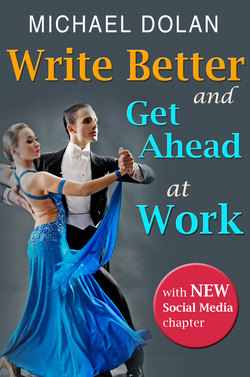Читать книгу Write Better and Get Ahead At Work - Michael Dolan - Страница 14
На сайте Литреса книга снята с продажи.
2. How to Create Reading Freewriting
ОглавлениеLet’s begin with a little fun. Rarely do we find anything in this life with a perfectly descriptive name, but one such name is “freewriting.” It’s one of my favorite writing exercises.
A definition of freewriting packs neatly into one sentence: “Write down whatever you think about for ten minutes straight without stopping.” That is it. Nothing more.
Yet so much happens. Freewriting is like the card game bridge. The rules are so exquisitely simple the players have room for unlimited expression. Anything can happen in freewriting.
It is the mirror of literary practices. Try it. You will find you write more and better than you thought possible. You will also, at times, produce garbage. Unstated but necessary to freewriting is constant movement forward. The writer must continue. Must continue. Must continue. Must continue. No room for self-editing, no time for doubt.
Now is a good time to try freewriting for five or 10 minutes.
Once you try it, pause for a moment to capture your experience of the moment. Answer the question “What was it like to freewrite?” Everybody has different experiences, of course. Maybe you experienced what I often feel. At first, I find it hard to write anything. Then something happens–it’s like a dam bursting–and I have a torrent of ideas. The task now becomes controlling and channeling these ideas, feelings, images, song tidbits and insights. I like to remember this transition for a particular reason. Sometimes when I sit down to write a memo or letter, I can’t think of anything. My mind is as blank as the paper (or screen). Sound familiar? But I don’t worry when that happens. I know myself. I have been blank before and I remember that soon a torrent will start. The key for me is to write anything. Then the ideas come. That’s why freewriting is helpful for me. I do it regularly.
As you freewrite, you will recognize your own comfortable writing process and will perhaps discover your own way of thinking.
Freewriting is a good way to exercise first thing in the morning. It gets you started when you cannot think of anything to write. It’s also a good way to end the day when you only have little time before quitting, not enough time to begin another project. In any event, when the boss walks by while you are freewriting, it looks good.
Most of all, I want you to enjoy freewriting. Writing is fun. Even at work. I enjoy writing, and I want you to enjoy it, too. As we work through this book, we do exercises that are more structured and probably less enjoyable than freewriting. But all writing can be fun—even pounding out the most pressured deadline report at work can be enjoyable. If you get nothing else from this book but a re-connection to the joy of writing, you will have won a lot.
You can find an excellent treatment of freewriting in the book Writing with Power by Peter Elbow. Peter has written a new book, along with others, entitled Nothing Begins with N: New Explorations of Freewriting.
